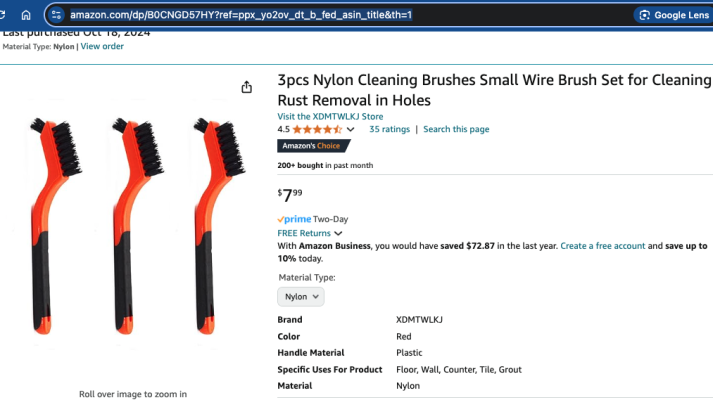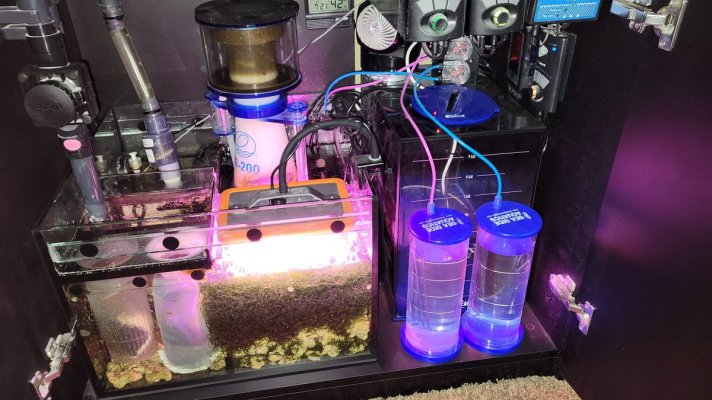Court Jester Goby eat hair algae in the wild. It will be an all he can eat buffet. He will be a happy fish.fat because is going to be halty or because is going to be big???
Navigation
Install the app
How to install the app on iOS
Follow along with the video below to see how to install our site as a web app on your home screen.
Note: This feature may not be available in some browsers.
More options
You are using an out of date browser. It may not display this or other websites correctly.
You should upgrade or use an alternative browser.
You should upgrade or use an alternative browser.
Help with green hair algae
- Thread starter Blueberry1988
- Start date
- Tagged users None
yes I'm trying but there's only much you can do with hand. the situation is not bad bad but is gonna be if I don't act. Ok so I'll try with my clean up crew and my hand see what happens... Does anyone recommend scraping the rocks with like a tooth brush?
I bought these nylon brushes for my GHA issue. So far so good. I was able to reduce the GHA by 80% on half the tank currently and going to work on the other half this weekend.

I either use a brush or pull out GHA by hand in my tank! (Or just have my urchin eat it)
I used a combination of things to get rid of my GHA, but they might not be applicable to a 15g cube.
The cause of mine was overfeeding. I created a frozen seafood mixture and didn't dilute it enough. The result was elevated nutrients and GHA covering everything in the tank. Most of my corals are trash at this point. Fortunately they were all cheap frags so it's not the end of the world (for me, at least).
First was to do extreme limits on feeding. We're talking one feeding every day or sometimes every three days. I also started feeding flake food for now.
I hand-picked whatever algae I could, which wasn't much.
Next was to start dosing NOPOX to limit my nitrates.
I got an algae scrubber to give the algae a place to grow that wasn't in the tank.
This all stopped the growth. Next was a bunch of tuxedo urchins and emerald crabs. The limited feedings also encouraged my turbo snails to start munching on the algae.
At this point there are only a couple of strands of GHA still holding out. The tank is otherwise void of it.
The cause of mine was overfeeding. I created a frozen seafood mixture and didn't dilute it enough. The result was elevated nutrients and GHA covering everything in the tank. Most of my corals are trash at this point. Fortunately they were all cheap frags so it's not the end of the world (for me, at least).
First was to do extreme limits on feeding. We're talking one feeding every day or sometimes every three days. I also started feeding flake food for now.
I hand-picked whatever algae I could, which wasn't much.
Next was to start dosing NOPOX to limit my nitrates.
I got an algae scrubber to give the algae a place to grow that wasn't in the tank.
This all stopped the growth. Next was a bunch of tuxedo urchins and emerald crabs. The limited feedings also encouraged my turbo snails to start munching on the algae.
At this point there are only a couple of strands of GHA still holding out. The tank is otherwise void of it.
How long did it take you to eliminate most of the algae?I used a combination of things to get rid of my GHA, but they might not be applicable to a 15g cube.
The cause of mine was overfeeding. I created a frozen seafood mixture and didn't dilute it enough. The result was elevated nutrients and GHA covering everything in the tank. Most of my corals are trash at this point. Fortunately they were all cheap frags so it's not the end of the world (for me, at least).
First was to do extreme limits on feeding. We're talking one feeding every day or sometimes every three days. I also started feeding flake food for now.
I hand-picked whatever algae I could, which wasn't much.
Next was to start dosing NOPOX to limit my nitrates.
I got an algae scrubber to give the algae a place to grow that wasn't in the tank.
This all stopped the growth. Next was a bunch of tuxedo urchins and emerald crabs. The limited feedings also encouraged my turbo snails to start munching on the algae.
At this point there are only a couple of strands of GHA still holding out. The tank is otherwise void of it.
- Joined
- Oct 21, 2016
- Messages
- 299
- Reaction score
- 110
I have found that using 1/4" airline tubing for water changes and sucking out as much as possible works well! I also agree with urchins, snails, and blue leg hermits. I raised my N and P and had the gha slowly disappear over time and get replaced with Coraline algae instead
If coral grows in blue so will algea.How old is the tank? Cut lights to 6 hours for few weeks with blue and uv only no whites. Diverse cleaner crew with tuxedo urchin and turbos. Daily manual removal. Raise magnesium to 1500. GHA is a normal part of tank activity and can be remedied in this manner but expect at least 2 months work.
Do you see anybody use blue lights in their fuge?If coral grows in blue so will algea.
I have for calarapa. Red is for blooming.Do you see anybody use blue lights in their fuge?
White light is a primary algae source. Blue light to a much lesser degree so when battling algae in a reef tank reduce white light and cut overall light duration. Corals still need something hence the need to maintain Blue and uv. Technically any light spectrum in sufficient intensity can grow algae but in a tank you need to eliminate the primary causal factors so you can weaken the enemy and let your cleaner crew and manual removal get ahead of the problem.I have for calarapa. Red is for blooming.
Most fuge are white and pink and red light for growth of stuff like chaeto. Minimal Blue if any. You can see this in my picture.
Attachments
Similar threads
- Replies
- 19
- Views
- 264
- Replies
- 7
- Views
- 170
- Replies
- 8
- Views
- 409
- Replies
- 1
- Views
- 91



















